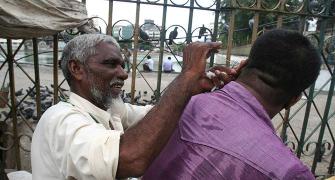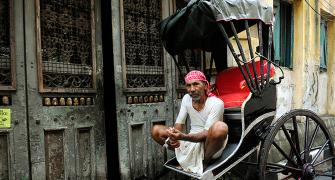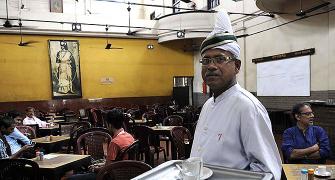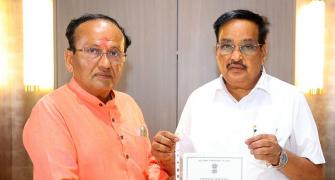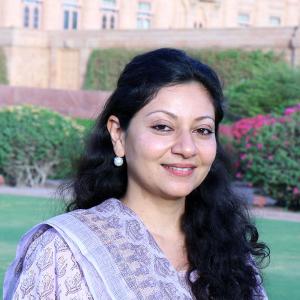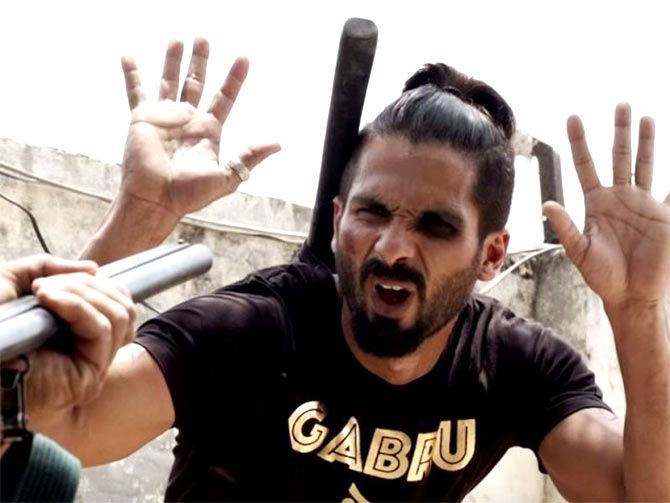
'Soft power is the power really to win friends and influence people with the strength of your ideas.'
'India's greatest soft power is being India itself. A nation of varied beliefs, states, creeds, castes, languages and yet embodying that spirit of unity in diversity.'
- Part 1: 'Bollywood saved my life'
- Part 2: 'India is a soft-shell crab'
Vikas Swarup, the ministry of external affairs spokesperson and writer of Q&A (adapted into Slumdog Millionaire), Kabir Khan, filmmaker (Bajrangi Bhaijaan, Kabul Express, New York) and Hugo Weihe, CEO of the art auction house, Saffron Art were panellists on the Shobhaa De moderated discussion, Soft Power, Hard Influence.
The discussion was part of the wide-ranging, impressive Gateway Dialogue, hosted by the think- tank, Gateway House, and the ministry of external affairs.
Rediff.com's Vaihayasi Pande Daniel listened in.
The choicest slices of the dialogue: The third and final installment of a three-part series.
Shobhaa De: Kabir, I wanted to ask you about the relevance of socially sensitive cinema. We seem to be very, very touchy about displaying any of our so-called weaknesses to the outside world. We would rather present a fantasy.
Yet it is movies like Sairat -- I am sure Thithi will also get that kind of recognition -- your documentaries, some of your films that have attracted the right kind of attention, internationally.
Do you believe that the film industry on the whole, and we as a people, have very thin skins. We want to project only a certain sanitised, prettified version of India and Indian culture?
Kabir Khan: The problem I am seeing right now is this whole narrative being built up -- the moment you critique anything in your country you are being labelled anti-national. So if you are making an Udta Punjab, talking about the drug problem in Punjab you are essentially defaming Punjab.
I have never understood this argument. We should be able to.
In fact, if we are critiquing something that is going wrong in the country we probably love our country more than the others, who are just indifferent (about it).
That is the problem over the last couple of years... whenever (the film industry) takes a hard stand on something. On certain a social issue there are always trolls and people coming after you, saying that you are anti-national by highlighting a certain problem. That you are actually doing a disservice to the country.
(The recent) high court verdict (on Udta Punjab) is definitely a big step in trying to counter that. We were looking for some sort of intervention, maybe from the ministry of information and broadcasting. That didn't come.
The high court verdict is a big step because it is going to embolden filmmakers to take on subjects with the knowledge that if one maverick certification board chief doesn't agree with you, you still have recourse to go to the court and get your film out.
There are certain battles that are worth fighting for and we should just keep making the films that are important and relevant.
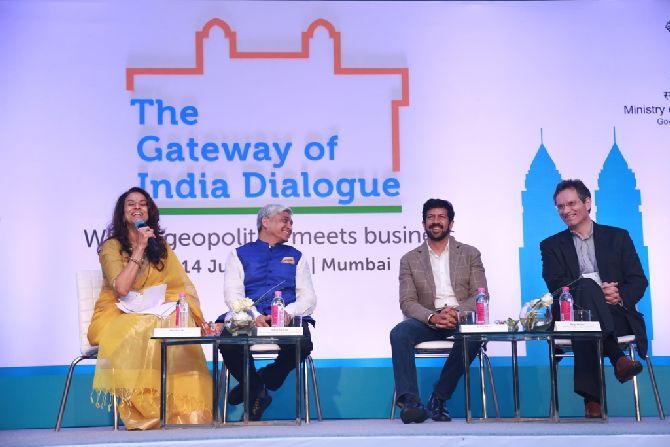
Shobhaa De: When (Information and Broadcasting Minister) Arun Jaitley mentioned last week that we can anticipate radical reforms as far as film certification goes, it sounded slightly ominous. One didn't know what to make of it.
So in this atmosphere of suspicion, what is the official kind of position on this? To have supported Pahlaj Nihlani (head of the Censor Board) was clearly unpopular by any standards... When a man heading the film certification board makes a press statement that he is proud to be known as Narendra Modi's chamcha, it is hard for someone like yourself (Vikas)-- a very creative, liberal thinking person -- to be in a position where you might have to defend that. How do you do it?
(Laughter)
Vikas Swarup: I need to only defend the ministry of external affairs and not any other ministry. Happily, I am not placed in that position where I have to defend the indefensible or something like that.
I think the government has made its position quite clear -- that it stands for artistic freedom. Mr Jaitley has said that the Censor Board will only certify movies and will not censor them. So let's wait for that move.
Kabir Khan: We in the industry get a feeling that the government looks at the film industry in a very frivolous manner. This is all song and dance and tamasha. They need to realise that Bollywood is a very strong influence across the world. They need to recognise that and therefore be more involved with what is happening in Bollywood.
Our films are travelling out. Today a big mainstream film like Bajrangi Bhaijaan is released in upwards of 40 countries around the globe. That's in the first phase. Then it releases in another 10 or 12. If you are reaching out to 50, 60 countries, and many more through pirated DVDs, it is an industry that they need to take notice of.
I remember in the case of New York, which had the backdrop of post 9/11 illegal detainees and did great business (it made Rs 61.89 crore/Rs 618.9 million worldwide), the then Syrian ambassador had met Shekhar Gupta (then the editor-in-chief of the Indian Express) and said that every family in Syria has watched this film on pirated DVDs.
He said we were really surprised that this film came from India. It should have come from one of the Arab countries because most of the victims were Arabs. I remembered at that point in time how powerful Bollywood is.
We were together, Vikas and I at the Cairo Film Festival, where New York was the opening film. That it is (beautiful) for a film that has already been released -- it is a rare honour. It shows that our films are being watched across the world and our government needs to take notice of that.
Shobhaa De: We know our incredible immense potential as a soft power. How can we possibly take it forward, in an impressive meaningful way, so that five years from now, if we are at a similar seminar, we will be speaking a different language? And maybe there will be many more elephants dancing in the room.
Vikas Swarup: I think the first thing to note, as Kabir also said, is that a soft power is beyond Bollywood (etc)... Soft power is the power really to win friends and influence people with the strength of your ideas.
India is a country that has never lacked for ideas. One of the earliest ideas that came out of India was of spirituality. Even modern India is a spiritual place where all the religions of the world co-exist and co-mingle.
Most importantly: In a post 9/11 world we are a model of upholding diversity. Many people started saying multiculturalism is dead etc... We provide a living example of how different faiths can co-exist in an atmosphere of tolerance and pluralism.
The other thing I want to point is the Indian Diaspora. They are themselves the biggest brand ambassadors of India's soft power. When you meet a techie in New York by the name of Vaidyanathan, the image that comes into somebody's mind -- 'Oh, he's an IT expert who can repair my laptop in a second.' In a sense that harks back to the notion of India as a knowledge economy.
Finally, most important of all, India's greatest soft power is being India itself.
A nation of varied beliefs, states, creeds, castes, languages and yet embodying that spirit of unity in diversity.
It's that image of India as a country where all kinds of people and all kinds of ideas can co-exist at the same time, without evoking conflict, I think, is the most powerful soft power that we can project.
Shobhaa De: Thank you, extremely well put!
(A big ripple of applause for Vikas Swarup).
Kabir, what would you say? How can we capitalise on over 100 years of powerful cinema that is our legacy? Maybe we haven't been able to do it as successfully as it deserves?
Kabir Khan: There is the way Bollywood is -- the grammar and the language of a Bollywood film. It is hugely accepted and appreciated in say the Middle East, North Africa and Southeast Asia, with all its song and dance and, you know, melodrama.
But that has been a problem (too) in that brand of cinema reaching out into say Europe and North America. Their tastes and sensibilities are different.
Something that has actually held us back from trying to reach out to those markets is actually we don't need those markets. We are one of the few, maybe after Hollywood, the only film industry in the world which is self dependent. Our audiences support us in such a big way that we don't need funding from any other market.
This is a question that is often asked: Why aren't more Indian films being sent to festivals? I keep telling them the reason is: We don't feel the need to. We are very happy with the way we are making films for India and the way it is being accepted by audiences.
Having said that, the new bunch of filmmakers are definitely coming in and there is a new (language) that is evolving. There are films that are being made -- almost every year we see them at Cannes, Toronto and other sorts of prestigious film festivals across the world.
We need to nurture those films also. Sometimes we tend to say let's go for these kinds of films and sometimes we pooh-pooh the traditional Bollywood films. There needs to be a mix of both. Then as a film industry we will really be able to go out and conquer many more theatres than we are doing right now.
Shobhaa De: Any new potential big stars on the art horizon that you (Hugo) have identified, who could take this forward?
Hugo Weihe: I don't necessarily want to mention any particular names. We have spoken about Indian society as a diverse culture that can show the way. On how we can live together. As a role model for the whole world.
India's art and culture represents a sublimation of that. It is everything together. It is the things that touched India. But India is also the soul leader for so many things (related to) spirituality, Buddhism, Hinduism and how that has touched so many people and how alive that is today. Buddhism has had a sort of resurgence everywhere as a philosophy in a sense.
I see the constant renewal of creativity out of India based on this coming out of history. It's a constant thought process there.

